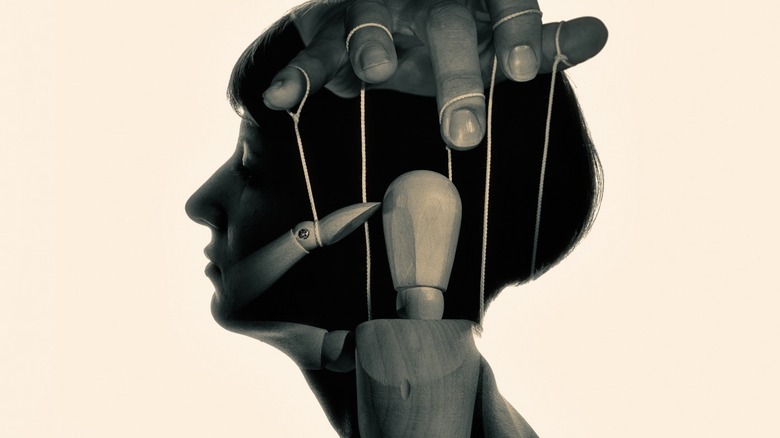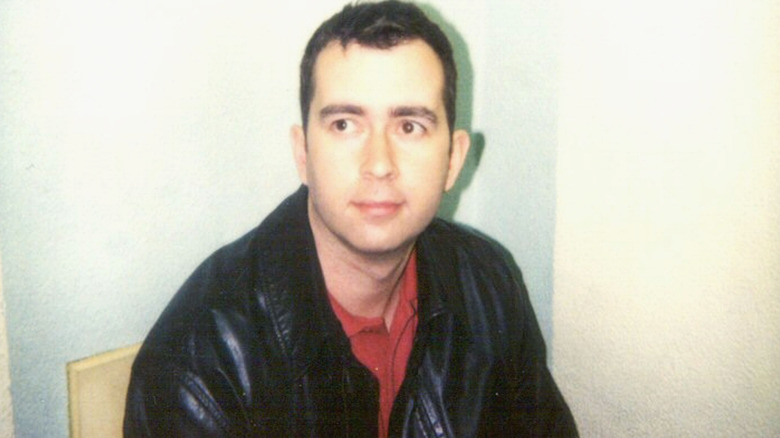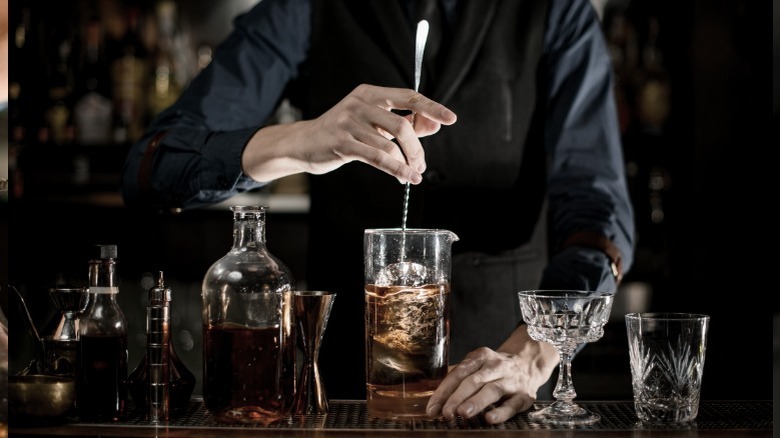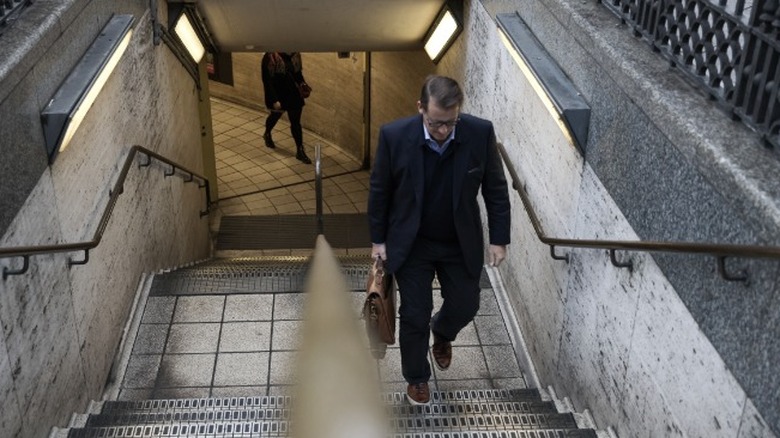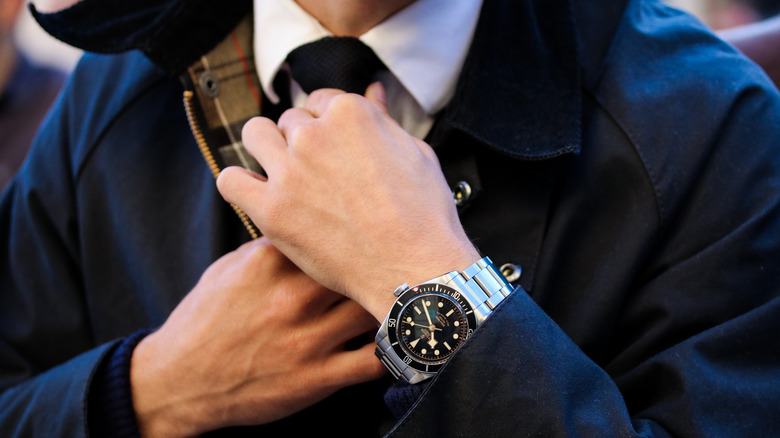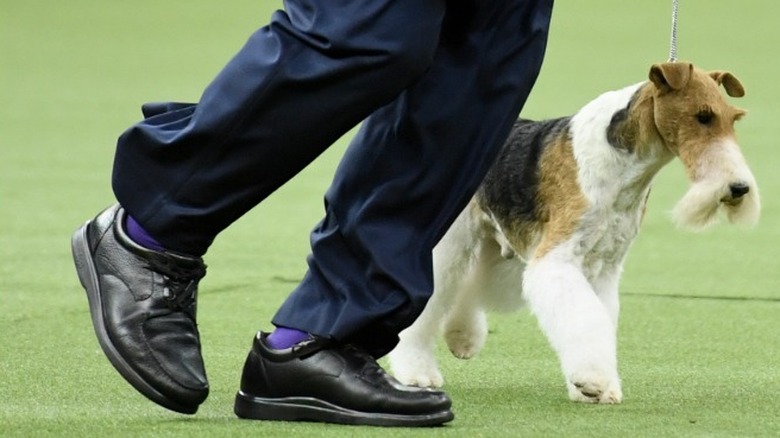The Untold Truth Of Robert Hendy-Freegard
Who is Robert Hendy-Freegard? This question has haunted detectives, grieving parents, and dozens of trusting victims. If you ask Freegard directly, he might describe himself as a carpenter, a bartender, a cordon bleu chef, a kitchen pipe-fitter, a fertility doctor, a nuclear engineer, a farmer, or — "if you can keep a secret" — an undercover agent for MI5, the U.K.'s domestic intelligence service. He was not, in fact, an MI5 agent. In 2005, per the Incorporated Council of Law Reporting for England and Wales (ICLR), Robert Hendy-Freegard was convicted of (then later acquitted for) orchestrating what the book "Crafty Crooks & Conmen" described as "one of the most elaborate and audacious frauds in British history."
The Crown Court at Blackfriars' Judge Pilay (per ICLR) describes him as an "egotistical and opinionated confidence trickster ... [with] not a shred of remorse or compassion...'" Detective Bob Brandon of Scotland Yard called him "the most accomplished liar" he has ever met (per The Irish Times), "a sad, pathetic individual who has achieved nothing in his life." In the words of Lord Phillips (per ICLR), Freegard "combines seductive charm with an astonishing capacity to deceive," ensnaring his victims in a "web of lies" then treating them with "callous cruelty." "Crafty Crooks" described him as "power-mad." His victims' lives become "a charade of humiliation, degradation, and despair."
"He's still to some extent in my head," one of his former victims said in 2005 (per "The Puppetmaster"). "If you said to me, 'Caroline, I'm going to order you a cab and I'm going to take you down to Wandsworth Prison, and he'll see you,' I'd go."
1971-1992
Robert David Freegard was born in Derbyshire in 1971. Raised by his mother, Freegard and his sister moved from town to town throughout their childhood. In "The Puppetmaster," Jay Cheshes writes that Freegard's former classmates remember him as a socially awkward child who kept to himself and enjoyed pranks. Freegard struggled in school, and at 14 years old he decided to drop out. The saga of Freegard's fraud begins in his hometown when he began dating a 26-year-old schoolteacher named Alison Hopkins. The brief relationship ended in 1992 when Alison discovered he had stolen her credit card and cleaned out her bank account (despite bragging to her that he was extraordinarily wealthy). She had also loaned him £1,500 (equivalent to about $4,000 in 2022) for business "startup costs," but he had simply pocketed the money.
Penniless and feeling duped, Alison tried to end the relationship. Freegard reacted so viciously that Alison decided to leave town. She moved 200 miles away to Newport, Shropshire. When Freegard found out, he followed her to Shropshire. Alison was terror-stricken to find found her ex-boyfriend breaking into her house (according to The Birmingham Post, republished by The Free Library). Freegard, seething that Alison had rejected him, told friends that he was planning to kidnap her. These friends turned him in to the police, and Freegard appeared in court on kidnapping charges in January 1993 (via "Crafty Crooks & Conmen"). Freegard decided to stay in Shropshire — briefly — then find a reason to skip town.
1992-1993
That reason appeared in the form of three students from Harper Adams Agricultural College: Maria Hendy, Sarah Smith, and John Atkinson. All three were from wealthy farming families. The three became regulars at the bar where Freegard, who had adopted the name "Rob," had picked up work as a bartender. "Rob" started dating Maria in December 1992, and one month later he began befriending her roommate John. One late night at the bar, Freegard "revealed" he wasn't actually a bartender — he was a secret agent working for MI5 (the British equivalent of the FBI). Freegard was undercover investigating an alleged IRA militia cell at John's college, where one of John's classmates at e had recently killed himself after being convicted of IRA gunrunning. "Do you really think he killed himself?" Freegard, age 21, asked his new "friend."
The saga of events that unfolded next is a wild journey that is described in the three-part Netflix documentary series "The Puppetmaster: Hunting the Ultimate Conman," and in nearly-endless British press coverage from the mid-2000s. In brief, Freegard convinces John Atkinson to lie about having terminal cancer and coerce his roommates into joining Rob and himself on a "road trip." According to the BBC, Freegard reveals that they are all now targets of an IRA plot and must cut contact with their families for their own safety.
1993-1995
From 1993 to 1995, Freegard moved the three from "safe house" to "safe house" (sometimes houses owned by his other victims) before he had them settle down at an apartment in Sheffield, according to "Rural Herefordshire: Where a Quiet Farming Life Was Shattered by the Forces of Hell." Freegard instructed the three to work menial jobs so they could pay "Rob's" bosses for their protection. "Rob" was often absent for extended periods of time "on business" (in actuality, he was maintaining his other cons, as noted in Regina v. Hendy-Freegard at ICLR). He did, however, find time to have two children with Maria Hendy, despite the fact that he would later virtually abandon them.
One of Freegard's more bizarre "cons" from their time in Sheffield was his relationship with Simon Young, a jeweler. As BBC and The Times reported, Freegard befriended Simon, then told him he was being "recruited." Freegard extorted no money from Simon, but sent him on various humiliating "operations." For one of these operations, Freegard sent Simon on a mission, instructing him as to exactly which doors he should use and which escalators, stairs, and bus routes he should take. Freegard instructed him to ride public transportation ostentatiously reading a copy of "The Gay Times." Simon was then instructed to purchase a can opener for £1.25, then enter a specific bar establishment and cryptically "deliver" it to the barman. The barman, understandably, was confused, but Simon was instructed he would be acting this way as a "test."
1996-1997
One of his most abused victims was Elizabeth Bartholomew, who met Freegard in 1996 while babysitting his children (via "The Puppetmaster"). When the two began an affair, Freegard, again being "targeted by the IRA," ordered her to cut contact with her family (or he would send explicit photos to her husband). Early in the relationship, Freegard began subjecting her to increasingly severe "loyalty tests." As a test ordered by his "bosses," Freegard made Elizabeth, a white woman, dress up in a traditional Indian wedding sari (with a bindi and bangles) then ride the public bus. He also ordered her to pretend to be a Jehovah's Witness (so his bosses would "let him" marry her), alter her appearance, and change her last name.
By 1997, Freegard had extorted over £300,000 from John Atkinson's family and over £200,000 from Sarah Smith's. After Freegard sent John on another prolonged "mission" involving a fake letter from "Nigel Carter-Baines," John, with the help of his family, finally refused Freegard's demands. He was able to cut contact in 1997, although not after meeting with Freegard one final time (when, according to "The Puppetmaster," Freegard ordered him to strip down to his boxers to check he wasn't "bugged"). Among Freegard's other victims was Leslie Gardner, whom he met at nightclub (introducing himself as an employee of "British Nuclear Fuels"), whom he defrauded of £16,000 (according to a report by the BBC). Despite his frequent absences from Maria Hendy, Freegard married her and changed his name to Robert Hendy-Freegard.
1998-2000
The con had become pretty financially lucrative by this point. While his wife and two children were on the brink of eviction, Freegard was spending tens of thousands on luxury goods. He bought a Rolex watch, tailor-made suits, and no less than seven BMWs. By 1998, per the Chiswick Calendar, Freegard became a regular at the Volkswagen dealership in Chiswick, London — where he found his charm worked well on the women — and decided to get a job there. He used his job at the dealership to find new victims, including Caroline Cowper, Elizabeth Bartholomew, Renata Kister, and Kimberly Adams.
In 2000, Freegard, still married to Maria Hendy, rekindled his relationship with Elizabeth. After convincing her to take out a £14,000 loan on his behalf and leave her husband, Freegard ordered her to go live on the streets as punishment for "failing a test." She was ordered to sleep on a park bench in the cold (without a jacket, food, money, or sanitary pads) for days or weeks at a time on multiple occasions (according to The Guardian). Eventually, he stopped having sex with her (according to an interview from the trial, cited by "Crafty Crooks & Conmen"), but he continued to control her, punish her, isolate her, and give her new "assignments," still promising marriage, off-and-on in 1996, 1997, and from 2000 until his arrest.
2000-2003
In 2000, Freegard became engaged to a 34-year-old lawyer named Caroline Cowper. In 2001, Maria Hendy and her children were evicted. Maria left Freegard later that year after he assaulted her once again (via "The Puppetmaster"). In 2002 Caroline also left Freegard. After the breakup, she started to investigate his past, and with the help of Sarah's father, finally got the attention of Scotland Yard.
Meanwhile, Freegard was already seeing 31-year-old Kimberly Adams, and the two became engaged in 2002. Among other bizarre instructions, Freegard made Adams quit her job as a school counselor because she "had AIDS." According to Adams in the Birmingham Post & Mail (posted at The Free Library), he also tried to convince her to move to a lighthouse in the Hebridean islands for 25 years so the two could monitor Russian submarines. By this point, Freegard had stolen over £22,000 from Adams (per the BBC), £22,000 from Cowper, £25,000 from Kister (per "Crafty Crooks & Conmen"), and £14,500 from Bartholomew (per "The Puppetmaster").
Per Independent, with the help of a sting involving Kim's parents, Scotland Yard, and the FBI, Freegard was arrested in May 2003 and charged with a long list of crimes. After police located a hotel room in the French Alps containing various missing women's passports, they began to search for his victims. In summer 2003, they found Sarah working for Renata Kister as a housekeeper, having been instructed by Freegard to pretend she did not speak English. The BBC reported that Elizabeth was not located until fall 2003, when she was found in Dunton Bassett living at a hotel with her body covered in sores.
2003-Present
Smith, Atkinson, Cowper, Adams, and Young all testified at his highly-publicized trial, which took place at the Crown Court at Blackfriars. (Freegard initially had four lawyers, but three quit out of "professional embarrassment.") In 2005, Freegard was convicted on 20 counts: two counts of kidnapping, three counts of "procuring the execution of a valuable security by deception," five counts of obtaining money by deception, and 10 counts of theft. He was sentenced to life in prison (as reported by The Guardian).
In 2007, Freegard appealed the kidnapping charges, arguing that Sarah and John could have left him at any time. In 2009, Freegard won the appeal. The kidnapping convictions were overturned and Freegard was released from prison. According to "Puppetmaster: Hunting the Ultimate Conman," Freegard began dating a woman named Sandra Clifton in 2012 and is now living somewhere in France or England, working on buying and selling pedigree dogs. Freegard insists he has changed, and has told the press he is tired of being vilified for "senseless mistakes" (per Newsweek). In 2014, Clifton "moved" with Freegard, who now goes by "David Clifton," and cut off all contact with her family.
